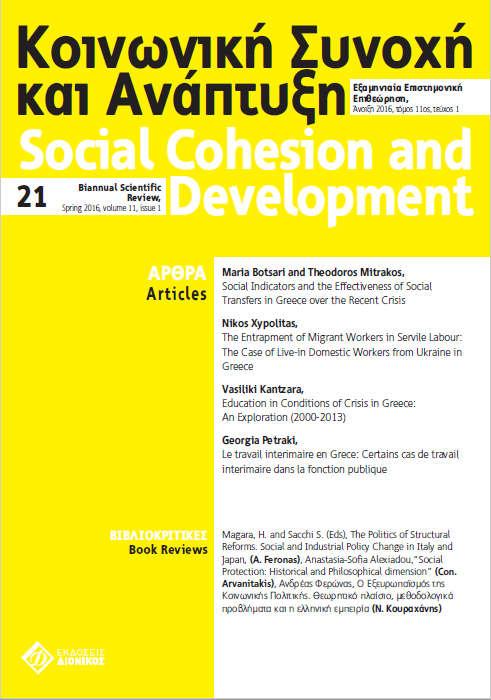Τάσεις στην Ελληνική Αγορά Εργασίας κατά την Περίοδο της Κρίσης, 2009-2014

Περίληψη
Λεπτομέρειες άρθρου
- Πώς να δημιουργήσετε Αναφορές
-
Botsari, M., & Zografakis, S. (2017). Τάσεις στην Ελληνική Αγορά Εργασίας κατά την Περίοδο της Κρίσης, 2009-2014. Κοινωνική Συνοχή και Ανάπτυξη, 11(2), 97–122. https://doi.org/10.12681/scad.14130
- Τεύχος
- Τόμ. 11 Αρ. 2 (2016)
- Ενότητα
- Άρθρα

Αυτή η εργασία είναι αδειοδοτημένη υπό το CC Αναφορά Δημιουργού – Μη Εμπορική Χρήση – Παρόμοια Διανομή 4.0.
Οι συγγραφείς των άρθρων που δημοσιεύονται στην Κοινωνική Συνοχή και Ανάπτυξη διατηρούν τα δικαιώματα πνευματικής ιδιοκτησίας επί των άρθρων τους, δίνοντας στο περιοδικό το δικαίωμα της πρώτης δημοσίευσης. Άρθρα που δημοσιεύονται στην Κοινωνική Συνοχή διατίθενται με άδεια Creative Commons 4.0 και σύμφωνα με την άδεια μπορούν να χρησιμοποιούνται ελεύθερα, με αναφορά στο/στη συγγραφέα και στην πρώτη δημοσίευση για μη κερδοσκοπικούς σκοπούς και με δικαίωμα τροποποίησης μόνον με παρόμοια διανομή (αν αναμείξετε, τροποποιήσετε, ή δημιουργήσετε πάνω στο υλικό, πρέπει να διανείμετε τις δικές σας συνεισφορές υπό την ίδια άδεια όπως και το πρωτότυπο).



